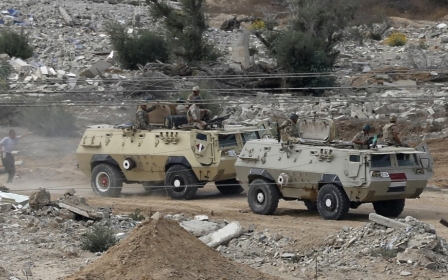War on Gaza: Israel-Egypt Rafah spat puts Biden in a bind

(AFP)
The deepening spat between Egypt and Israel over Rafah’s shuttered border crossing is putting the Biden administration in a bind, as the minor progress it made increasing humanitarian aid into Gaza slows to a snail's pace.
For months, the Biden administration has said it is prioritising surging more humanitarian aid into Gaza. While the amount of aid reaching Gaza had been minimal compared to before Israel’s invasion of the besieged enclave, US officials and aid workers had noted some small gains in deliveries.
The number of aid trucks entering Gaza had nearly doubled from 2,545 in the month of November to 5,671 in April, according to the UN. That amount was just 37 percent of the number of trucks entering Gaza before the war broke out on 7 October, when 80 percent of Gaza’s population relied on aid. But with the closing of Rafah’s border crossing, the situation has deteriorated further.
This week, the World Food Programme warned that the “modest progress” made in boosting aid deliveries was at risk and that famine “never loomed larger” in the enclave. The UN agency said it hasn’t been able to access its warehouses in Rafah for more than a week because of the fighting there.
The focal point of the crisis is Rafah, the southern Gaza border town where over a million Palestinians are sheltered, and the Strip's main outlet for aid through its crossing with Egypt.
Stay informed with MEE's newsletters
Sign up to get the latest alerts, insights and analysis, starting with Turkey Unpacked
Israel seized the Palestinian side of the crossing earlier this month. The attack riled Egypt, which is worried that fighting in the enclave could spill over into the volatile Sinai peninsula and spark a refugee crisis along the border.
In a call on Monday with Egyptian Foreign Minister Sameh Shoukry, US Secretary of State Antony Blinken reiterated the Biden administration's opposition to a forced displacement of Palestinians from Gaza.
Israel has proposed opening the crossing while it continues its offensive in other parts of Rafah and maintains security control.
According to Reuters, Egypt has said it will only recognise Palestinian control of Rafah, while the Palestinian Authority has ruled out managing the crossing under “Israeli rule”, according to Arabic media reports.
The dispute is a particularly nasty one for the Biden administration to resolve because it combines the immediate need to surge aid to Palestinians starving in Gaza and posturing by Israel for how the besieged enclave’s crossing will be controlled in the future.
Dave Harden, a former USAID mission director in the West Bank and Gaza, told Middle East Eye that Israel’s moves at the Rafah crossing appear to be positioning it for “long-term military occupation”.
“To the extent the Israelis are taking [those] steps, the Biden administration will oppose it.”
'Token tunnel checks'
The Biden administration is at odds with Israel over a post-war plan for the enclave. Prime Minister Benjamin Netanyahu has ruled out the Palestinian Authority returning to govern Gaza and has chaffed at calls to take meaningful steps towards a two-state solution that could unlock the support of neighbouring Arab states.
Egypt is refusing to budge in the dispute because it feels Israel has flouted the two countries' 45-year-old peace treaty and newer agreements stipulating the deployment of troops on either side of the Rafah crossing. On Thursday, Egypt deployed additional armoured personnel carriers and soldiers to its border with Gaza in northeastern Sinai.
Analysts say that Egypt views the attack as a direct threat to its national security.
“The issues facing Egypt are very real. Egypt faces an influx of Palestinian refugees when it's in its worst economic crisis for 60 years,” Mirette Mabrouk, director of the Middle East Institute's Egypt programme, told MEE.
On Thursday, Egyptian President Abdel Fattah el-Sisi made a rare move to wade directly into the dispute when he called Israel "delusional".
"We found Israel continuing to escape its responsibilities and evade efforts exerted to reach a ceasefire," he said at an Arab League summit in Bahrain.
Analysts say that Egypt is unlikely to suspend its peace treaty with Israel over the dispute, but in addition to publicly criticising Israel, could quietly stonewall cooperation on security matters that both the US and Israel need - like cracking down on any remaining Hamas tunnels between Sinai and Gaza.
"Egypt can just start doing 'token' tunnel checks," David Witty, a former US Army Special Forces colonel who served in Egypt and author of the book, The US-Egypt Military Relationship, told MEE.
"If Egypt stopped cooperating with Israel, it could be a problem."
Middle East Eye delivers independent and unrivalled coverage and analysis of the Middle East, North Africa and beyond. To learn more about republishing this content and the associated fees, please fill out this form. More about MEE can be found here.





